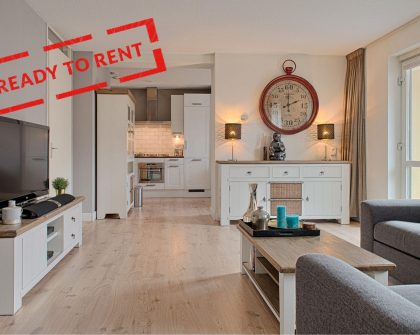“If I want to let my own home, can I terminate the tenancy agreement if I decide to sell it?” During my time at Interhouse, nearly 13 years now, I must have heard this question – or a version of it – a hundred times. The short answer is no, you can’t – unless certain terms and conditions have been met in advance (on which more below). As many (new) landlords come up against this and many other questions, often the same ones, I’ve listed the top five FAQs for you below.
1. What does my home need to include if I want to let it?
It’s difficult to give a one-size-fits-all answer to this question. Firstly, you need to decide whether you want to let your residential property unfurnished, semi-furnished or furnished. This depends on the target group you wish you to attract, but also on its location. Oddly enough, what is standard varies from region to region – including what tenants do and don’t want. For instance, it’s usual to leave the washing machine and dryer in a semi-furnished property in Wassenaar, while this is not the case in many other locations. It may also be that you simply don’t have the option of placing the furniture in storage, leading to you preferring to let the property furnished. Read the blog Bas Ros of Interhouse Haarlem on preparing to let your home.

2. What if the tenant doesn’t treat the property well or is slow paying the rent? And can Interhouse prevent this?
Prevention is better than a cure. That’s why we always thoroughly screen potential tenants. At Interhouse, this involves much more than a simple credit check: our screening comprises up to 13 steps. This thorough screening means that we have had very few cases of poor tenants over the past 21 years or more. Letting will never be completely risk-free, as not even the very best screening can exclude all risk. Earning a return always involves some measure of risk.
A follow-up question is often whether the landlord can retain the deposit if the home turns out to have suffered damage at the end of the tenancy period. Any damage inflicted by the tenant on the property or inventory that goes beyond normal wear and tear needs to be put right by the tenant. If the tenant has been given sufficient opportunity to repair the damage and has failed to do so (or failed to do so to a high enough standard), as a landlord you are entitled to repair the damage at the expense of the tenant. You will then need to provide proof of the cost and if applicable may deduct that amount from the deposit.
3. Do I need to notify my mortgage lender if I let my home?
Yes, you certainly do! Almost all mortgage contracts for owner-occupied properties include a clause that states that the property must be and remain unencumbered by tenancy. However, mortgage lenders will often consent to the property being let, as long as the terms and conditions are correct and everything is arranged properly. The above doesn’t normally apply to mortgages on residential properties that have been bought as an investment. In most cases these will involve a buy-to-let mortgage, which already contains consent to let the property.
4. Do I need to pay tax over the rent I receive?
Although in terms of taxation each situation involving letting a residential property is different, as a general rule a property switches from box 1 (work and home) to box 3 (assets). This is because by definition as an owner you no longer occupy the property yourself. In box 3 you are not entitled to mortgage interest relief, but you do need to pay wealth tax over the value of the property (based on the WOZ value under the Valuation of Immovable Property Act) minus the mortgage debt. The system for box 3 will change in 2021, meaning that you will need to take into account your assets being taxed at other rates in future. Incidentally, the Dutch tax authority requires you to do little or no work in relation to the property and its management. You can read more in the blog by Rob Antonis on how to keep you rental income in box 3. We are not tax advisors, but we can explain how the general legislation works or put you in touch with the right advisor.
5. Can I simply terminate the tenancy agreement if I no longer wish to let the property?
The question with which I started this blog cannot be answered in a few sentences. Tenants enjoy fairly extensive protection in the Netherlands in order to prevent abuses by mala fide landlords. This is of course positive, as tenants are often the weaker party against more powerful landlords.
However, I personally believe that in a few specific cases this protection of tenants has gone too far. When, for instance, a landlord has bought a single apartment to supplement their pension and ends up with a tenant who fails to pay the rent, it can take months for the landlord to dissolve the tenancy agreement. This means that the landlord will have to go without that (potentially essential) pension supplement for all those months, never mind the return on the investment suddenly being reduced to 0% for the next few years.
Let’s return to the temporary letting of properties though: tenants enjoy proper protection here too. We call this security of tenure, although security of tenancy period might be a more appropriate description. It is indeed possible to let your home temporarily in the Netherlands. The two most common cases are:
- Landlords who let their home temporarily with the intention of living in it again at a later date may make use of what is colloquially known as a diplomat contract (temporary tenancy). This is often used by home owners who work abroad for a short period. One precondition, however, is that the landlord does indeed revert to living in the property. The sale of a property is therefore not a legal reason for terminating this type of contract.
- Since 1 July 2016 there is a new type of tenancy agreement for a fixed period of a maximum of two years for self-contained accommodation. This tenancy agreement gives the landlord the option of terminating the tenancy agreement after a maximum of two years. Yet there are strict terms and conditions attached to this type of contract. For instance, no fixed term may be included in which the tenant is not permitted to give notice and the tenant must be notified by the landlord of the approaching end date before the end of the tenancy period. Update: In 2024 the rules regarding this tenancy agreement change, rad about it in our blog: “The fixed-term tenancy agreements act“.
Both types of temporary lets involve a large number of snags that need to be worked out properly in advance and included in the tenancy agreement. Read the blog to find out more about selecting and using the correct tenancy agreement. Throughout the tenancy period, the landlord also needs to give notice, extend or terminate the agreement correctly.
Three bonus questions especially for you
1. What insurance policies should a landlord take out and what do they cover?
The two most important types of insurance for let properties are building insurance and liability insurance. If a let property is furnished, you may also want to consider taking out contents insurance.
Building insurance
This insures your property and all fixed items belonging to it against fire, burglary or storm damage, for example. It is important to inform the insurer that the property is let. If, after damage has occurred, it transpires that the property was let, the insurer may refuse to pay out.
Liability insurance
Strangely enough, a property can cause damage to third parties or the tenant; think, for example, of a falling roof tile. That is why it is advisable to take out liability insurance for this. Here too, the insurer must be informed that the house is being let.
Contents insurance
If the let property is furnished, you can insure the contents with contents insurance (also known as inventory insurance). This often only covers damage caused by fire, storm and theft, but not damage caused by the tenant. You also have to deal with depreciation for older contents. So consider carefully whether the (current) value of the contents is high enough to insure them.

2. May I temporarily let my house?
There are several forms of temporary letting with their own terms and conditions. For example, if you are temporarily leaving your home with the intention of returning after a certain period of time, you can let your home temporarily. This allows you to keep your property without incurring high additional costs.
In this situation, it is important that you have the correct tenancy agreement drawn up. If certain formalities are not met, you run the risk that the tenancy agreement can no longer be terminated and the tenant is allowed to remain in the house. When terminating the tenancy agreement, you must comply with the statutory notice period and it is important that the termination is done on the correct grounds, namely “own occupation”.
The period of letting must be explicitly stated and the tenancy agreement cannot be terminated prematurely by the landlord. However, the tenancy agreement may be extended for a certain period if the return of the landlord is delayed.
3. What rental price may a landlord charge for letting a house?
In the Netherlands, we have the Housing Valuation System (WWS). You can apply a points system to the property, in which factors such as square metres, property value, energy efficiency and luxury level earn points. If the property does not exceed a certain number of points, it falls within the regulated sector. In that case, as a landlord, you are bound by the fixed maximum rent based on that specific number of points. This point limit is re-determined annually.
If the number of points for the property exceeds the limit, the tenant and landlord are free to agree on a rent. However, the market value is often decisive: the rent a tenant is willing to pay for a property. In many cases, Interhouse advises on the rent to be charged in the private sector; it is often more sustainable to ask for a realistic price. A realistic price also contributes to tenant satisfaction.
If you’re considering letting a residential property, I hope this blog has already answered a few of your questions. Please don’t hesitate to contact us if you’d like to know more: our agents can advise you according to region and type of property and assist you with your applications to the mortgage lender and tax authority. We will be happy to help you!
Tips:
- The internet contains a great deal of misinformation on letting. Make sure you only use reliable sources, such as rijksoverheid.nl;
- If you’re considering buying a residential property to let, come along to one of our (Dutch) information evenings for investors;
- Always contact a specialist to answer your questions and assess your personal situation. At Interhouse we work with over forty experts who can provide you with the information you need, taking all the details of your specific case into account.
More blogs

Temporarily letting a property meant for your studying child, this is how it works afer July 1st 2024

Temporary letting through the Vacancy Act: how to avoid vacancy and high costs


